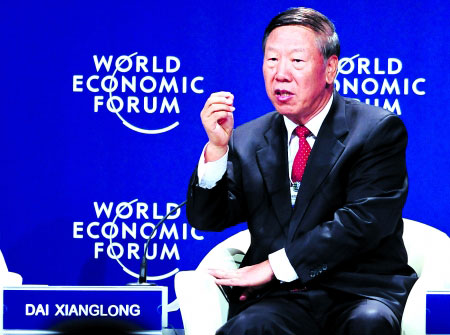China ready to further liberalize RMB capital account
- By Yang Xi
 0 Comment(s)
0 Comment(s) Print
Print E-mail China.org.cn, September 13, 2012
E-mail China.org.cn, September 13, 2012
 |
|
Dai Xianglong, chairman of the National Council for Social Security Funding (NCSSF) and the former governor of the People's Bank of China. |
"China is now ready to further liberalize its renminbi capital account," said Dai Xianglong, chairman of the National Council for Social Security Funding (NCSSF) and the former governor of the People's Bank of China, on Wednesday during the Summer Davos 2012 in Tianjin.
China could liberalize its capital account as early as 2015, he said, though he did caution that the international community would have an influence on the pace of the reforms.
China's financial reforms should focus on the internationalization of its currency, the renminbi, and the reform of interest rates, Dai added.
As China’s renminbi is becoming more and more internationally convertible, global trade will naturally provide China with a platform to become a dominant economy on the world stage, Shanker Ramamurthy, president of Global Growth & Operations, Thomson Reuters, told China.org.cn on the sidelines of the Summer Davos. Dai also suggested that China should speed up its reviews of investments from qualified foreign institutional investors (QFIIs). He added that the QFII threshold should be lowered or even removed in the future.
The renminbi will play a bigger role in stabilizing the global currency system and in improving the prospects of the global economy, stated Nobel laureate and the "father of the euro" Robert Mundell last Saturday at the China International Investment and Trade Fair in Xiamen, Fujian Province.
China took a huge step forward in liberalizing its currency regime in April of this year, doubling the daily onshore trading band for the renminbi to 1 percent and thus taking the country one step closer to its goal of achieving full renminbi convertibility by 2015.





